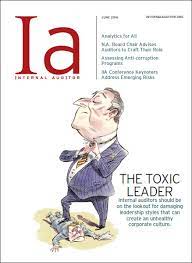Read Internal Auditor June 2016 online
Toxic leaders create toxic workplaces. How do you know when your company’s culture is toxic? If you do a Google search for “toxic workplace,” you’ll get numerous articles on the signs to look for. One sign shows up repeatedly in these articles: Your work negatively affects your health—physically and emotionally.
This subject hits home. Several years ago, my husband found what he believed to be his dream job: an accountant for a company in an industry he had grown up around and loved. For the first several years, everything was great—and then there was a change in management. The new executives had little interest in learning how the business worked, managed through fear and intimidation, and were big on hiring friends and family. Rumors ran rampant about restructuring and dismissals. My husband would send me texts at least twice a week after being verbally assaulted by one of the new executives. He came home from work every night stressed and depressed. His blood pressure shot through the roof. So he did what he knew he needed to do—he got out. He was able to find a job in accounting in the same industry. He was lucky.
Not everyone is as fortunate. Many people stay on the job, feeling like they don’t have a choice and hoping, if they just keep their heads down and avoid the gossip and politics, it will get better. Unfortunately, “this is nonsense,” says Liz Ryan, CEO and founder of the Human Workplace, and author of “Six Signs Your Company’s Culture is Toxic” (Forbes, August 2015). “In the history of mankind a broken corporate culture has never gotten better on its own. Your two choices are to leave the organization or to name the elephant on the table and let some air into the conversation.”
Shining a light on the problem is never easy. Enter internal audit. As author Jane Seago points out in this month’s cover story, “internal auditors must remain vigilant in spotting [toxic leaders] and taking appropriate steps to contain the damage (see “Toxic Leaders, Toxic Culture” on page 28). With the help of a team of IIA experts, Seago identifies several traits of toxic leaders and asks audit leaders and corporate culture experts their thoughts on internal audit’s role in identifying these individuals and effective mitigation tactics.
From a business standpoint, toxic cultures affect an organization’s productivity, company value, creativity, profitability, and growth and often are at the root of fraudulent behavior. From a personal standpoint, toxic cultures affect lives, both of the employee experiencing it and the family he or she goes home to. When a toxic culture can’t or won’t be changed, it’s time to consider other employment options. No job is more important than one’s health and happiness.







